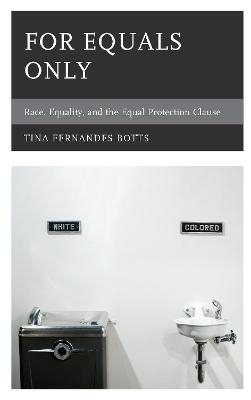
For Equals Only
Lexington Books (Verlag)
978-1-4985-0123-1 (ISBN)
This book philosophically explores how changing conceptions of race and equality have affected Supreme Court interpretations of the Equal Protection Clause of the 14th Amendment to the U.S. Constitution over the years. In the years since the 14th Amendment was ratified in 1868, in its decisions interpreting the Equal Protection Clause, the Supreme Court has switched from using a sociocultural concept of race to using a biological concept of race, and during the same time period has switched from using a social to a legal concept of equality. One result of these trends is the recent emergence of something called 'reverse discrimination.' Another result is that the Equal Protection Clause no longer specially protects racialized persons from racial discrimination, as it was originally intended to do. Using the tools of legal hermeneutics, critical philosophy of race, and critical race theory, key cases of racial discrimination in equal protection law are examined through a historical lens. The Supreme Court’s switch, over the years, from interpreting the Equal Protection Clause as specially protecting racialized persons from continued racial discrimination after the end of the institution of chattel slavery, to interpreting the Clause as protecting everyone from racial discrimination, is tracked alongside changing conceptions of race and equality. As the concept of race became biological, the concept of equality became legal, and the result was the elimination of remedying the negative effects of chattel slavery on the equality status of racialized persons from the Supreme Court’s list of priorities.
Tina Fernandes Botts is assistant professor of philosophy at California State University, Fresno.
Introduction
Chapter Summaries
Chapter 1: Scholarly Backdrop
Legal Hermeneutics
Critical Philosophy of Race
Critical Race Theory
Origins: The Work of Derrick Bell
Critical Race Theory and Equality
Chapter 2: Equal Protection and Racialized Persons
The Rise of Separate But Equal Doctrine
What is Equal Protection?
Racial Discrimination Per Se Begins: Japanese Americans after WWII
Social Segregation
Separate as Inferior
Separate But Equal Overturned
Racial Classifications and Marriage
Discriminatory Intent vs. Discriminatory Impact
Bakke: Racial Discrimination Per Se is Formalized
Post-Bakke Fall-Out
Concluding Reflections
Chapter 3: The Concept of Race and Equal Protection Law
The Supreme Court’s Switch from Sociocultural/Sociohistorical Race to Biological Race
The Academic Switch from Biological Race to Sociocultural/Sociohistorical Race
A Change in Understanding of the Problem of Racial Discrimination
Concluding Reflections
Chapter 4: The Concept of Equality and Equal Protection Law
Early Equal Protection Law: Social Equality
Contemporary Equal Protection Law: Legal Equality
Legal Equality is Out of Step with the Purpose of the Clause
Historical Context
Legislative History
Legal Equality is Out of Step with the Contemporary Sociocultural Context
Legal Equality Facilitates and Perpetuates the Problem of Racial Inequality
Concluding Reflections
Chapter 5: The Special Case of Multiracial Racialized Persons
Historical Engagement Between Multiracial Racialized Persons and the Law
Antimiscegenation Laws
Jim Crow Laws and Segregation
The “One Drop” Rule
The Failure of Antidiscrimination Laws to Protect Multiracial Racialized Persons
Biological Races
Racial Discrimination Perpetuates Historically Situated Oppression
Toward a Distinctive Multiracial Group Identity
An Additional Modification to Antidiscrimination Law
Concluding Reflections
Chapter 6: Thoughts Moving Forward
| Erscheinungsdatum | 10.05.2021 |
|---|---|
| Reihe/Serie | Philosophy of Race |
| Verlagsort | Lanham, MD |
| Sprache | englisch |
| Maße | 159 x 238 mm |
| Gewicht | 399 g |
| Themenwelt | Geisteswissenschaften ► Philosophie |
| Recht / Steuern ► Arbeits- / Sozialrecht ► Arbeitsrecht | |
| Recht / Steuern ► EU / Internationales Recht | |
| Recht / Steuern ► Öffentliches Recht | |
| Sozialwissenschaften ► Ethnologie | |
| Sozialwissenschaften ► Soziologie ► Makrosoziologie | |
| Sozialwissenschaften ► Soziologie ► Spezielle Soziologien | |
| ISBN-10 | 1-4985-0123-0 / 1498501230 |
| ISBN-13 | 978-1-4985-0123-1 / 9781498501231 |
| Zustand | Neuware |
| Informationen gemäß Produktsicherheitsverordnung (GPSR) | |
| Haben Sie eine Frage zum Produkt? |
aus dem Bereich


